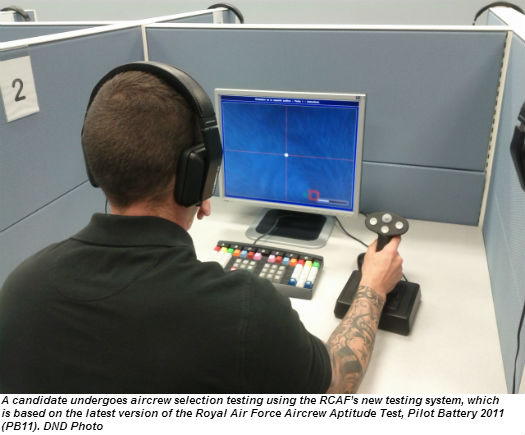RCAF Press Release | April 29, 2014
Estimated reading time 6 minutes, 19 seconds.
There’s no doubt that it takes “the right stuff” to succeed in the demanding field of military aviation. But exactly what is “the right stuff” in the 21st century? And how can the Royal Canadian Air Force (RCAF) ensure that it is selecting the men and women with the right stuff to carry out three of the most challenging jobs in the Air Force?
In the recent past, the RCAF pilot candidates were selected largely based on their demonstrated abilities to perform tasks on an aircraft simulator developed in the 1990s. This emphasized the candidate’s “hands and feet” – but several decades of attrition statistics have shown that this alone was not a sufficient predictor of aircrew training success.
Over the past several years, the RCAF saw that it needed to upgrade its pilot selection system and training philosophies to better reflect the increased mental workload demanded of its next generation air operations officers.
With rapid advancements in technology, the military aircraft cockpit has become significantly more intricate and multifaceted. Today’s “glass cockpit” technology places greater mental demands on the pilot, often calling for attention splitting among multiple tasks. (The glass cockpit refers to the modern aircraft cockpit featuring digital [electronic] instrument displays and LCD screens rather than analogue dials and gauges).
Modern aviation also puts a much higher emphasis on mental skills associated with managing and interpreting complicated information in a rapidly changing three-dimensional environment. Aerospace control officers and air combat systems officers also face similar complex cognitive demands during their training and employment tasks.
After several years of research and visits to allied Air Force assessment, selection and training establishments in France, the United Kingdom, the United States and Israel, the RCAF decided to focus on screening for specific cognitive and learning abilities in our next generation of aircrew officers.
In the summer of 2013, the RCAF adopted a new pilot advanced selection system…but now it’s not just for pilots anymore!
The new selection system, on lease from the Royal Air Force, comprises a series of computer-based ability tests with the look and feel of video games. These tests have been scientifically designed to measure abilities in seven specific cognitive domains: strategic task management, perceptual processing, short-term memory and capacity, spatial reasoning, symbolic reasoning, central information processing and psychomotor ability.
The new system is also more efficient, allowing for the streamlining of applicant throughput at the Canadian Forces Aircrew Selection Centre at 8 Wing Trenton, Ont., which now has a capacity to evaluate up to 40 candidates per week, more than double that of the previous system.
Officer Cadet Jace Patkai recently was one of those candidates; he went through aircrew selection in November 2013.
“I was very nervous as I stepped off the train in Trenton because this was my first exposure to a military environment,” recalls the Carleton University political science graduate, who is originally from Montague, Prince Edward Island.
Officer Cadet Patkai had prepared himself diligently by researching the aircrew selection tests online and sharpening up his basic mathematical skills, but admits he was still surprised by the format and intensity of the multiple tests.
“I found it very challenging, right from the first test on day one. My strategy was just to try and do the best I could with the time I had.”
When debriefed on his performance after the two days of testing, he was elated to hear the words “You’re going to Toronto,” which is where pilot candidates undergo medical screening if they successfully complete the aircrew selection testing. He is now looking forward to continuing his training within the Canadian Armed Forces, and hopes one day to fly helicopters in the tactical aviation role.
But improved selection methods are only part of the training success equation. Highly motivated students and an effective training system are equally critical.
There has been a conscious shift within the training system to an increased focus on the timely acquisition and development of aviation skills, and adequate opportunity for sufficient practice and skills mastery. These factors, coupled with well motivated students and instructors, will significantly contribute to increased training performance and success rates.
Furthermore, considerable human resource and financial cost savings will be achieved by reducing improper occupation assignments, training failures and voluntary withdrawals. The new computer-based tests can also be more readily modified to reflect future requirements, making it more adaptable to the rapidly-changing nature of military aviation.
The RCAF now has the capacity to use a comprehensive cognitive aptitude testing system to identify appropriate candidates for aerospace control officer and air combat systems operator, as well as for pilot. This process should result in increased efficiencies and training success rates for the air operations occupations.
It is clear that aircrew in the 21st century must still have the right stuff to succeed and perform in the demanding military aviation environment. The RCAF is now well equipped with the “right tools” to screen and select “the right stuff” in three of the most challenging Air Force occupations.

